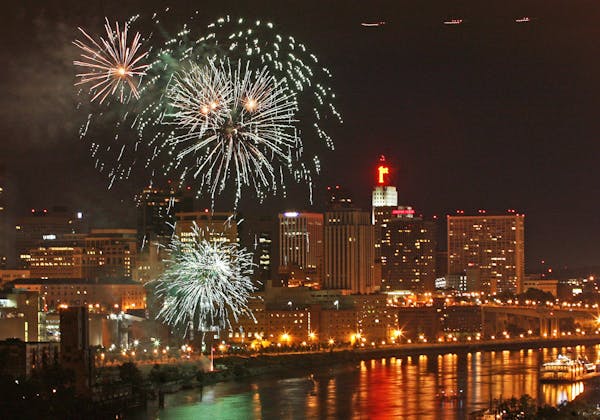Bottle rockets, Roman candles and other aerial fireworks could — legally — light up Minnesota skies this July 4th if some lawmakers have their way.
Minnesotans have long ignored the state's laws and shot off fireworks and firecrackers here, but they head across the border to pick up the goods, said Sen. Torrey Westrom, a Republican from Elbow Lake whose district abuts North Dakota.
"This really comes down to where you think we should collect the sales tax — Minnesota or neighboring states?" said Westrom, who is pushing to allow the sale and use of such pyrotechnics in Minnesota.
The perennial attempt by lawmakers to allow flashier fireworks is likely to run into a roadblock at Gov. Mark Dayton's office. Dayton vetoed a similar bill in 2012 and reiterated his opposition for the measure in 2016.
Westrom said he hopes Dayton changes his mind this year, noting broad support from residents.
But State Fire Marshal Bruce West and other fire officials said at a hearing Wednesday night that the legislation would result in more dangerous and costly incidents. More than 730 Minnesotans have been injured by fireworks over the past decade, according to surveys conducted at hospitals around July 4th. And on average, about $359,000 worth of property is damaged annually by fireworks, according to data from the Minnesota Fire Incident Reporting System.
"They indisputably cause injuries and fires," Burnsville Fire Chief B.J. Jungmann said. "We believe the use of explosives should be left to professionals."
The League of Minnesota Cities also opposes the change. Legalization would cause conflicts between neighbors over noise, debris and property damage, the league wrote in a letter to Westrom and Rep. Jason Rarick, R-Pine City, who authored the House version of the bill. Taxpayers would end up paying for additional calls to law enforcement and fire departments, the letter states.
The bill would allow cities and towns to add their own fireworks regulations.
Mark Lazarchic, who owns Renaissance Fireworks, with more than 40 locations throughout the Twin Cities area, lobbied for the change in years past but said he has given up hope this year. He and other sellers are currently limited to sparklers, fountains and novelty items, such as string poppers and devices that release smoke.
Lazarchic said customers who stop by his shop to pick up sparklers and novelties often will mention that they already made a much more expensive run to Wisconsin for bigger fireworks.
Iowa legislators voted last year to allow the sale and use of such explosives, after decades of more stringent regulations. Wisconsin requires its residents to have a permit to buy or light aerial fireworks. But companies there will sell to Minnesotans, Lazarchic said, which is why the state's border with Minnesota is dotted with so many fireworks businesses.
North Dakota also allows the sale of aerial fireworks and firecrackers, though some cities prohibit it. The state limits when businesses can sell fireworks to certain times of the year. However, the website for a large fireworks dealer in the state, Memory Fireworks, says people who are not North Dakota residents are welcome to buy fireworks from the company year-round.
"That's why everyone hears them in their neighborhoods, hears them at the lake," Westrom said. "It's time to update the law."
Mayor of North Carolina's capital city won't seek reelection this fall

Minnesota lawmakers aim to protect rideshare drivers hurt on the job — but pay remains unresolved

